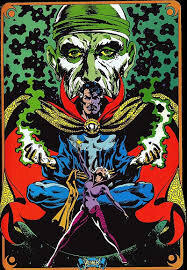
Marvel Comics in the 1970s
About This Project
This blog serializes the first draft of a book in progress, Marvel in the 1970s: The World Inside Your Head (under contract with Cornell University Press).
Marvel in the 1970s saw a transformation that initially looked seamless on the surface, but proved almost as dramatic as Bruce Banner turning into the Hulk. The new, younger writers who took over the titles shifted the emphasis and perspective from the “world outside your window” to the “world inside your head.” In a thoroughly visual medium and a decidedly action-oriented genre, these writers went beyond mere quirks of characterization and and angst-filled monologues to a quixotic attempt at interiority.
After a chapter about humanism in the era of Stan Lee, Jack Kirby, and Steve Ditko, this book/blog focuses on the work of five writers: Marv Wolfman (Tomb of Dracula), Doug Moench (Planet of the Apes, Werewolf by Night, Shang-Chi: Master of Kung Fu) , Steve Englehart (Avengers, Captain America, Captain Marvel, and Doctor Strange), Don McGregor (Black Panther and Killraven), and Steve Gerber (Howard the Duck, Man-Thing, Omega the Unknown, The Defenders). The comics they produced at Marvel during the 1970s were a crucial step forward in the evolution of the medium, but the peculiarities of the industry and market at the time have been an obstacle to a broader readership in the era of self-contained graphic novels.
Coda: Claremont Rising
Claremont’s X-Men invites the readers into the heroes’ minds while making the process of identification effortless
The Drake's Progress, or Howard and the Everyday Picaresque
For Howard, there is no way out. He is trapped in a medium he never made.
Obligatory Comic Book Fight Scene
Howard the Duck functions best when it gives the title character ample opportunity to do what he does best: riff on the action as it unfolding
The Duck Who Scolded Me
Howard’s constant sniping is connected to the characteristic that makes him the embodiment of the true satiric impulse: Howard is disappointed.
Too Young to Die
Cancellation was not just inevitable; it was thematically consistent with the plight of the comic’s own heroes.
Hulk Smash Existential Dilemma
Careful readers come to realize that all the real action in Omega takes place in the captions.
Self: Sufficient? Omega the Unknown’s Mind/Body Problem
The James-Michael/Omega doubling emphasizes the incomplete, fragmentary nature of their selfhood.
Talking Heads
At their best, The Defenders was not just metaphorically cerebral; it came close to being literally cerebral as well
The Comic as Nightmare Box
Man-Thing comics, like the Nightmare Box, are a vehicle for both sparking and absorbing emotion in the people who hold them.
Monsters on the Verge of a Nervous Breakdown
Why bother giving a mindless creature a nervous breakdown?
Portrait of the Artist as a Teenage Swamp Monster
Gerber grants the gift of subjectivity only to those characters who are capable of identifying with another
Can the Subhuman Speak?
For a character with literally no personality, Man-Thing had a surprisingly successful run
New Ears Have Arrived
Being the only talking duck on Earth is not the true source of Howard’s world-weary skepticism; it is simply the visible representation of a pre-existing condition
The Uses of Disenchantment
Our world, like Marvel, is absurd by definition. We just dress better.
T’Challa (Almost) Died for Your Sins
In fighting the Klan, the Panther is tangled in a complex narrative and ethical knot
Dear White People
The more time we spend with Kevin Trublood, the more McGregor’s choice of an almost all-Black cast for “Panther’s Rage” seems wise.



















